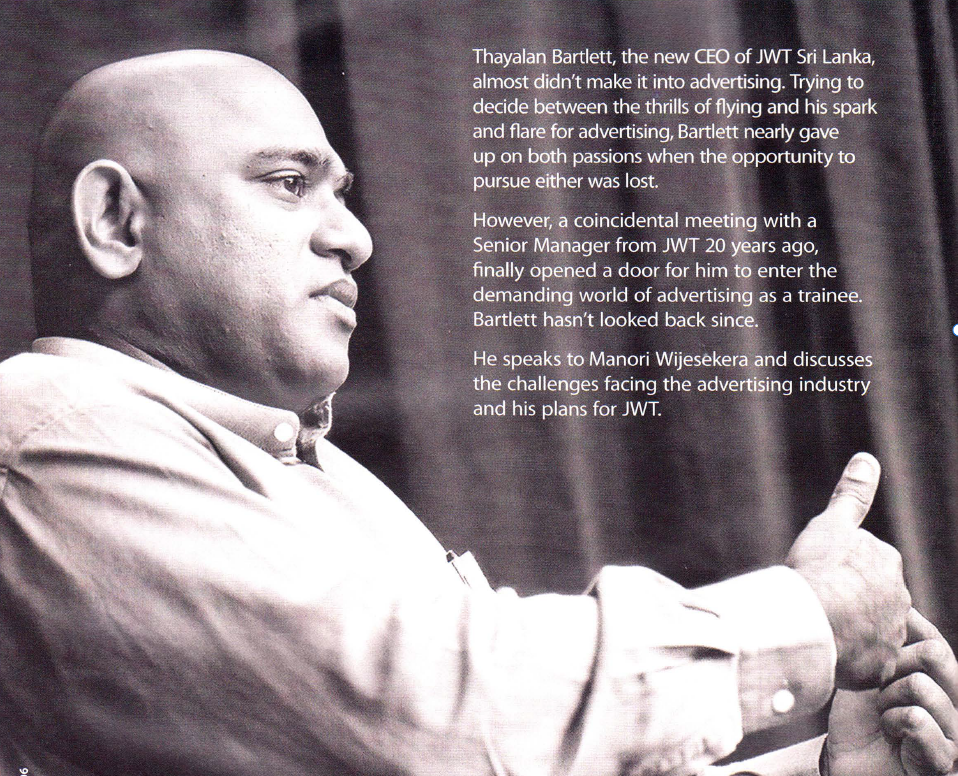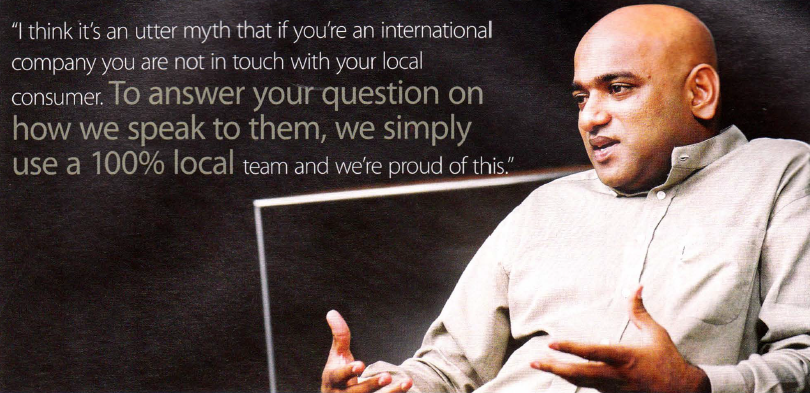
What excites you most about being in the field of advertising?
From a very young age I used to look at advertising and say to myself: “If I had done this ad I would have done it differently.” Advertising used to involve me and intrigue me very much. I used to rewrite ads, come-up with slogans for school activities, etc. Now that I have been in this business for sometime this excitement has evolved into a serious relationship with my trade. When I think brands I get energised. In fact you need to get excited or else you simply cannot exist in this business. When I first joined I simply enjoyed being in a creative environment. But after being at JWT for a while, I understood more about its discipline, like the tools you use to strategically develop brands, and the survival skills you require to endure this job. These are the attributes that galvanised me to the business. You also need to be a capitalist of sorts because you need to be a “brand man” and enjoy brands even before you think you are an advertising person. Today your excitement should be based on the conviction that you are indeed a powerful influencer if you are in advertising. Because it actually is your prerogative as an advertising person to decide what brand of car your customer should drive today; which bank he should open an account with; what brand of shirt he must wear; in which restaurant he must dine; and which credit card he should pull out first to pay.
The power of an idea is what you create as an advertising person. Most brands and services are of parity and you need to emotionally leverage the status of your brand in the consumer’s over cluttered mind. This task really excites me and that is why I am still in the business of advertising.
Advertising is a business not everybody will enjoy. Unless you have the passion and drive to enjoy the process of crafting ideas, you won’t survive it. There is pressure to deliver at all times. The high rate of staff turnover within our industry is a result mostly of this pressure. But if you know how to enjoy stress and you know how to shed fatigue fast it becomes a very rewarding job. I think I am fortunate to be in advertising. Now and then I think otherwise, but you rebound fast and realise there is no better place to be in.
What excites you about your new role as the CEO of one of Sri Lanka’s top five advertising agencies?
Firstly, I will not trade my role as an advertising person for a designation. That will be suicidal and it surely will be the fastest way to exit the industry. I enjoy turning up in office every morning because there is something exciting awaiting me. Sometimes it’s in the form of a problem (which is exciting to resolve) and sometimes a challenge to do something innovative and different. To be the CEO of JWT is only an extension of a responsibility of any CEO. A statutory responsibility exists, like meeting company financial goals and setting a plan for growth expansion, and to charter a new course for our people and our brands in a very demanding consumer and economic environment. My new title is only to say that I am “responsible” for that. Nothing else changes. The responsibility of maintaining creative standards, meeting revenues, winning awards, keeping clients happy is the responsibility of all at JWT. But for the past 20 years the most exciting part of my job has always been to be involved in the energetic process of idea creation and to enable the transfer of that energy and excitement to those who work with me.
The advertising industry itself is going through some rapid transformations. What are some of the main changes, which are currently impacting this industry?
There are many challenges that we as an industry are facing. Firstly there is a misconception that if you have a Mac you can be in advertising. A lot of companies have adopted cost control measures by investing in their own inhouse studios. This is a short sighted move that works against long term brand building ideas. Unfortunately in our industry price has taken precedence over the value of an idea. Advertising and idea creation is all about adding value to products so that they become brands. There is a huge difference between designing a poster and developing an idea that will work as a poster. Most decisions today are based on execution and not on brand ideas . Most new brands today are built on fragile brand values, as the, are mostly execution based. That is why one day the are gung-ho and the next day they are no more. It’s about time the marketing industry begins to value ideas. Good Ideas are priceless but a poster execution is Rs15,000. The marketer needs to decide which is best for their brand. The second challenge is a global phenomena where the traditional system of remuneration is moving from commission to fees. The fee system is complex and is not as straightforward as a commission.
Agencies and clients are still trying to work out a suitable framework to work within to benefit both. In the past Marketing Directors and Brand Managers worked alongside agencies and remunerated them according to the work agencies produced. Today you discuss brand strategies and ideas with the marketing team but turn to the procurement manger for your remuneration. Good ideas are priceless and cannot be negotiated on the number of hours you put in. I honestly don’t know how many hours it took the guy who came-up with the line “Have-a-break, Have-a-KitKat. That idea has netted Nestles millions of dollars around the world and I am sure the agency too would have been justifiably remunerated because it was developed during the pre-fee era. But if you apply an hourly rate to it today the agency guy might not be able to even afford the chocolate. Thirdly, advertising as an industry is not given due recognition in Sri Lanka. Advertising is increasingly considered to be an unnecessary expense, a waste, and an unhealthy corrupt method to create consumer choice.
“I am not a believer of visions and missions. They are statements that are good as a one-day workshop. I am a believer of a philosophy for JWT Colombo. Something people can live by.”
Whereas in a developed country and in most developing countries advertising is an integral part of the economic process creating demand and ensuring supply. Their definition would be that advertising is an integral part in consumer choice. It is considered an investment in branding. It helps maintain quality and competitive pricing. It keeps markets healthy and contributes to economic buoyancy. However the arbitrary taxation last year in the form of the 50% tax add back and more recently the levy on imported commercials is restricting the growth of our industry. The ability to grow brands and markets is becoming even more challenging for the marketer and their communication partners.
Each new CEO, no matter how ingrained into the system, brings in a personal vision for the company. What is your vision for JWT Sri Lanka?
I am not a believer of visions and missions. They are statements that are good as a one day workshop. I am a believer of a philosophy for JWT Colombo. Something people can live by. As an agency we have collectively made a declaration and told ourselves we do not want to be another agency. We have a strong philosophy to respect people’s time and how best we can use that time to interact with them. Whilst doing this if the people at JWT have a creative attitude, then so will our work. If our work has an attitude so will the agency. If we succeed our clients will proposition us. We have to empower our people to have that attitude. It’s all about the idea, insight, and the independence for them to do it.
I will not trade my role as an advertising person for a designation.
One of the biggest challenges facing any advertising CEO is to keep the big ideas flowing effortlessly. How do you plan to kep the creative juices flowing in your team?
The challenge is to keep the process of regular training happening on an ongoing basis, to continuously update our staff with new tools and thinking that takes place globally. It’s a well-known fact that we are one of the biggest trainers in the world in advertising. Our commitment to training has been recognised not only by our staff and clients but also by our competition, and we are known as the University of advertising. We are very liberal with training and we will continue to do so. As we speak we have seven people this week in Malaysia, India and Bangkok undergoing training in different areas. This year alone we would have had at least 10% of our staff trained overseas. This is apart from the local training programmes we have conducted and To keep the creative juices flowing, combinations of elements are constantly in motion like training, inflaming spirit and winning awards. They all work in tandem to make JWT a unique and successful place. All these elements are non-negotiable, they happen regularly and the juices will flow and the big ideas will continue to happen. We are a highly potent and lethal team when it comes to creativity and award winning work.
What value addition do you bring in to JWT Sri Lanka? What will you add to the company in your new role?
Being a 100% globally owned company means that we have our own systems and procedures that are very sound. These don’t require any change. But what I will be doing is to create a place where the ground is fertile and conducive for creative expression and for the production of outstanding work. It would be an environment for free thinking and the teams will be empowered with the independence to do just that. We thrive on success and what we have achieved so far is tremendous in this industry. But as a team we have told ourselves this is not good enough and we want more of it. Very soon you will see us winning a major international award. Creativity will continue to be our highest importance and every thing I will do during my tenure will be to support this cause.
Being an international company, with many of the systems and learnings being developed at JWT New York or London, how do you ensure that you cover local brands effectively? How do you talk to local consumers in a voice they can understand?
I think it’s an utter myth that if you’re an international company you are not in touch with your local consumer. If you look at JWT India, they’re working in a far more complex society with dozens of ethnic groups, languages and religions – but JWT is a huge success in India and we’re a success here in Sri Lanka. We believe that we understand our consumer more intimately than any other agency. That is why we are a very successful and an effective agency in Sri Lanka and our success is not because we are international. We think local, we act local and it is hugely advantageous to be part of a truly international network. JWT today is a global giant in over 100 countries because it consciously recognises the importance of being local in the country they operate. Here in Sri Lanka we don’t think any differently. To answer your question on how we speak to the local consumer, we simply use a 100% local team to communicate with them and we’re proud of this. We consider the local consumer as our clients. If they buy our ideas, we are in business. Our dedicated Sinhala team is revered in the office and is given priority in every aspect. They are known as JWT’s “Balaya”. Creative briefs are written in Sinhala (where required) so that we do not miss out or dilute the effect of the ultimate product. As for the systems and tools you asked about I like to say that systems don’t produce good advertising. People do. Systems and tools only help us to be disciplined in our approach.
It appears that the marketing industry is more focused on the short-term goal of returns rather than looking at building brands. Is this also your experience of the marketing industry?
The marketing business used to be about satisfying consumer needs but today it’s all about satisfying shareholder “wants”. Short-term sales are a must but should not be at the expense of building long-term value. Most companies are programmed to operate this way but we need to respond to it rather than react to it.
The absence of long term brand value is being felt today. Today’s mega brands still remain to be LUX, Pepsi, HSBC, Sony, Coke, Marlborough, etc., and they enjoy a very rich heritage of some strong brand building work which ha taken years to build. Today the e brand could ur iYe the mo t lethal economic onslaught and might stutter but will regain and continue to perform for another 100 years. Short term sales are mostly driven by price cuts or banded offers. These are bad influences that a good brand can be easily lured towards and eventually succumb to. One of our key philosophies at JWT Sri Lanka is to help achieve short-term sales, while staying true to building long term value.






